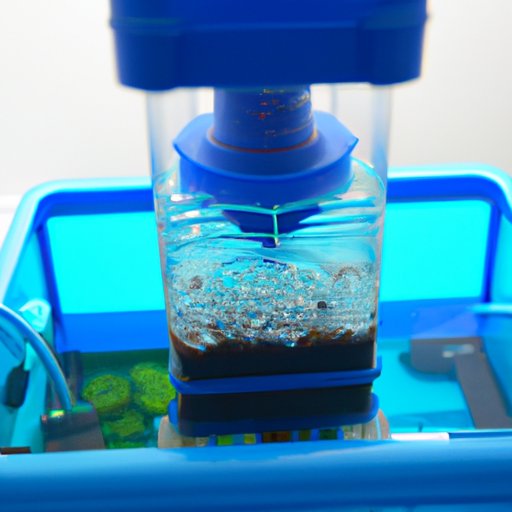Introduction
Well water is water that comes from below the surface of the ground, typically from an underground aquifer or spring. As it makes its way to the surface, it’s exposed to potential contaminants such as bacteria, viruses, nitrates, iron, and sulfur. In this article, we’ll explore ways to clean well water naturally in order to make it safe for drinking, bathing, and other uses.

Install a Whole House Filtration System
Installing a whole house filtration system is one of the most effective ways to clean well water naturally. These systems are designed to remove sediment, iron, sulfur, and other contaminants from your water supply. The benefits of using a whole house filtration system include improved water quality, better taste, and reduced risk of health problems associated with contaminated water.
There are several types of filtration systems available for well water. Some systems use a combination of sediment filters, activated carbon filters, and reverse osmosis filtration. Others may use a single type of filter or a combination of different types. The cost of installation and maintenance will vary depending on the type of system you choose.
Use an Activated Carbon Filter
An activated carbon filter is a type of filtration system that uses charcoal to absorb impurities from water. It’s especially effective at removing chlorine, volatile organic compounds (VOCs), and other contaminants. The advantages of using an activated carbon filter include improved taste, odor, and color of the water, as well as reduced risk of health problems associated with contaminated water.
When using an activated carbon filter, it’s important to replace the filter frequently. Depending on the type of filter you have, the frequency of replacement can range from every few months to every few years. Additionally, be sure to follow the manufacturer’s instructions for proper use and maintenance.
Utilize Reverse Osmosis Filtration
Reverse osmosis filtration is a process that removes contaminants from water by forcing the water through a semipermeable membrane. This type of filtration is particularly effective at removing dissolved solids, heavy metals, nitrates, and other contaminants. The benefits of using reverse osmosis filtration include improved water quality, better taste, and reduced risk of health problems associated with contaminated water.
The cost of installing and maintaining a reverse osmosis system will vary depending on the size and complexity of the system. Additionally, you’ll need to periodically replace the filters and membranes, which can add to the overall cost.

Try Aeration for Iron and Sulfur Removal
Aeration is a process that involves introducing air into water in order to remove iron and sulfur. This type of filtration is relatively inexpensive and can be used in combination with other filtration systems. The advantages of using aeration include improved taste and odor, as well as reduced risk of health problems associated with contaminated water.
The cost of installing and maintaining an aeration system will depend on the size and complexity of the system. Additionally, you may need to periodically replace parts of the system, which can add to the overall cost.
Try Ultraviolet Light Purification
Ultraviolet light purification is a process that uses UV rays to kill bacteria and other microorganisms in water. This type of filtration is particularly effective at killing bacteria, viruses, and other pathogens. The benefits of using UV light purification include improved water quality, better taste, and reduced risk of health problems associated with contaminated water.
The cost of installing and maintaining a UV light system will vary depending on the size and complexity of the system. Additionally, you’ll need to periodically replace the bulbs, which can add to the overall cost.

Consider Adding Natural Minerals to the Water Supply
Adding natural minerals to your water supply is another way to clean well water naturally. Some of the most common minerals to add include calcium, magnesium, and potassium. These minerals can help improve the taste and odor of water, as well as reduce the risk of health problems associated with contaminated water.
The cost of adding natural minerals to your water supply will depend on the type and amount of minerals you choose to add. Additionally, you may need to periodically replenish the minerals, which can add to the overall cost.
Conclusion
Cleaning well water naturally is an effective way to ensure that your water supply is safe for drinking, bathing, and other uses. Installing a whole house filtration system, utilizing an activated carbon filter, utilizing reverse osmosis filtration, trying aeration for iron and sulfur removal, utilizing ultraviolet light purification, and adding natural minerals are all effective ways to clean well water naturally.
In conclusion, there are many ways to clean well water naturally. Each method has its own benefits and costs, so be sure to research each option carefully before deciding which one is right for you. With the right knowledge and resources, you can ensure that your well water is safe and clean.
(Note: Is this article not meeting your expectations? Do you have knowledge or insights to share? Unlock new opportunities and expand your reach by joining our authors team. Click Registration to join us and share your expertise with our readers.)
